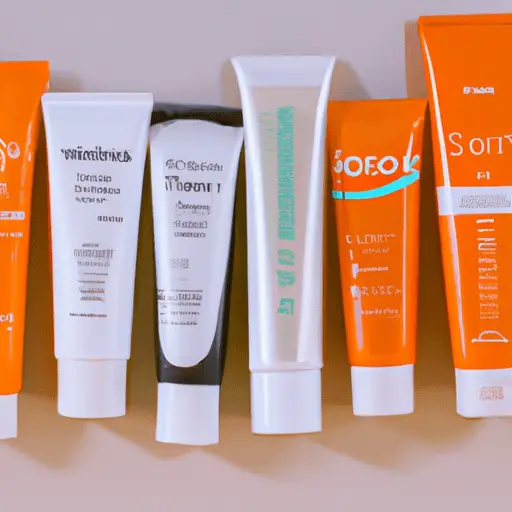-
Table of Contents
- Different Types of Sunscreens and Their Benefits
- Key Takeaways
- Introduction: The Importance of Sunscreen
- Chemical vs Physical Sunscreens
- Understanding SPF Ratings
- Additional Benefits of Sunscreens
- The Health Benefits of Regular Sunscreen Use
- FAQ Section
- 1. What is the difference between UVA and UVB rays?
- 2. How often should I reapply sunscreen?
- 3. Can I use sunscreen on my baby?
- 4. Does sunscreen expire?
- 5. Can I use sunscreen if I have acne-prone skin?
- Conclusion: The Power of Protection
- Further Analysis
Different Types of Sunscreens and Their Benefits

[youtubomatic_search]
Key Takeaways
- Understanding the different types of sunscreens can help you choose the right one for your skin type and lifestyle.
- Chemical and physical sunscreens work in different ways to protect your skin from harmful UV rays.
- SPF ratings are important, but they’re not the only factor to consider when choosing a sunscreen.
- Some sunscreens offer additional benefits, such as moisturizing properties or antioxidants.
- Regular use of sunscreen can protect against skin cancer and premature aging.
Introduction: The Importance of Sunscreen
With the increasing awareness about the harmful effects of ultraviolet (UV) rays, the use of sunscreen has become an essential part of our skincare routines. However, with a plethora of options available in the market, choosing the right sunscreen can be a daunting task. This article aims to demystify the different types of sunscreens and their benefits.
Chemical vs Physical Sunscreens
One of the primary distinctions in sunscreens is between chemical and physical formulations. Chemical sunscreens, containing ingredients like oxybenzone and avobenzone, work by absorbing UV rays and converting them into heat, which is then released from the skin. On the other hand, physical sunscreens, also known as mineral sunscreens, contain zinc oxide or titanium dioxide and work by reflecting UV rays away from the skin.
Understanding SPF Ratings
SPF, or Sun Protection Factor, is a measure of how well a sunscreen can protect your skin from UVB rays, which are primarily responsible for sunburn. However, it’s important to note that a higher SPF doesn’t necessarily mean better protection. According to the Skin Cancer Foundation, an SPF 15 sunscreen blocks about 93% of UVB rays, while an SPF 30 sunscreen blocks 97%, and an SPF 50 blocks 98%. Beyond SPF 50, the increase in protection is minimal.
Additional Benefits of Sunscreens
Many sunscreens offer additional benefits beyond UV protection. For instance, some sunscreens are formulated with moisturizing ingredients, making them a good choice for individuals with dry skin. Others contain antioxidants, which can help protect the skin from free radical damage. Some sunscreens are also water-resistant, making them ideal for use when swimming or sweating.
The Health Benefits of Regular Sunscreen Use
Regular use of sunscreen can protect against skin cancer, including melanoma, the deadliest form of skin cancer. According to the American Academy of Dermatology, daily use of an SPF 15 or higher sunscreen reduces the risk of developing melanoma by 50%. In addition to cancer prevention, sunscreen also plays a key role in preventing premature skin aging. A study published in the Annals of Internal Medicine found that regular sunscreen users had 24% less skin aging than those who used sunscreen sporadically.
FAQ Section
1. What is the difference between UVA and UVB rays?
UVA rays penetrate the skin more deeply and are primarily responsible for premature skin aging and wrinkling. UVB rays, on the other hand, are the main cause of sunburn and play a key role in the development of skin cancer.
2. How often should I reapply sunscreen?
The American Academy of Dermatology recommends reapplying sunscreen every two hours, or immediately after swimming or sweating.
3. Can I use sunscreen on my baby?
For babies under 6 months, it’s best to avoid sun exposure and dress them in protective clothing. For older babies and toddlers, sunscreen can be used, but opt for a physical or mineral sunscreen that’s designed for sensitive skin.
4. Does sunscreen expire?
Yes, sunscreen does expire. Most sunscreens are designed to remain at original strength for three years. Check the expiration date on the bottle to ensure its effectiveness.
5. Can I use sunscreen if I have acne-prone skin?
Yes, but choose a non-comedogenic sunscreen that won’t clog pores. Look for formulations designed for oily or acne-prone skin.
Conclusion: The Power of Protection
Understanding the different types of sunscreens and their benefits can empower you to make informed decisions about your skincare routine. Whether you opt for a chemical or physical sunscreen, look for a broad-spectrum formula with an SPF of at least 30. Remember, regular use of sunscreen is one of the most effective ways to protect against skin cancer and prevent premature skin aging.
[youtubomatic_search]
Further Analysis
In conclusion, the key takeaways from this article are the importance of understanding the different types of sunscreens, how they work, and their benefits. Regular use of sunscreen can protect against skin cancer and premature aging, and many sunscreens offer additional benefits such as moisturizing properties or antioxidants. Remember to reapply every two hours and choose a sunscreen that suits your skin type and lifestyle.

Leave a Reply